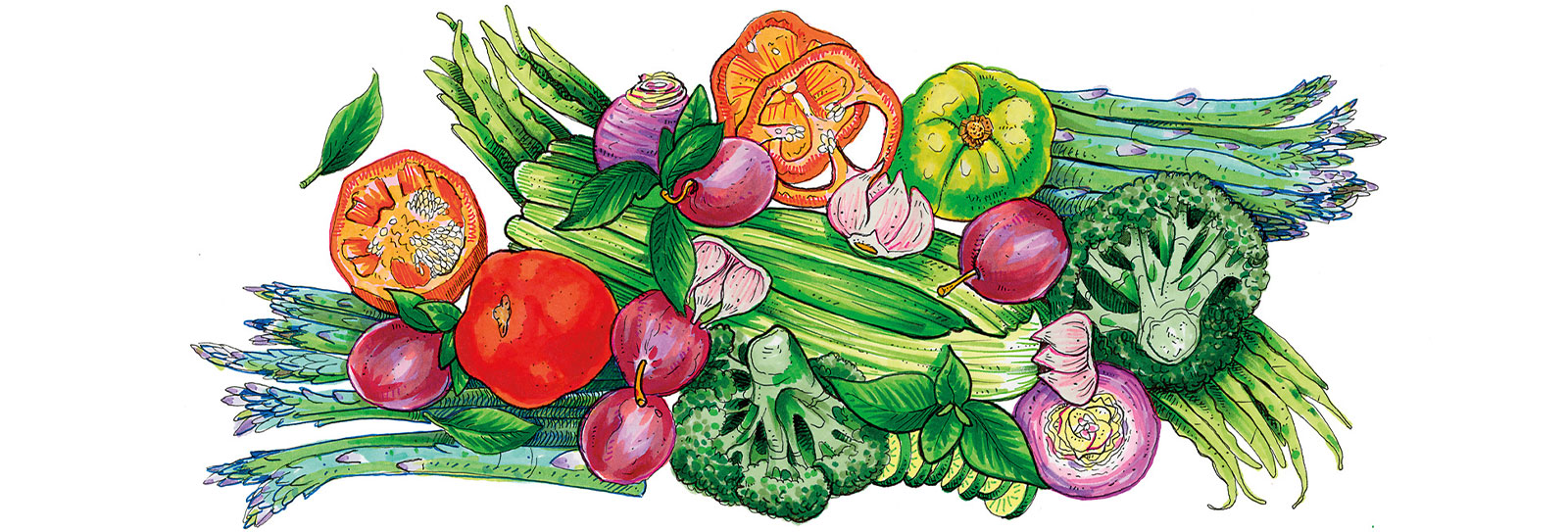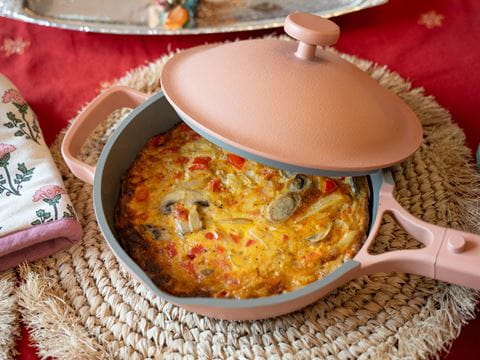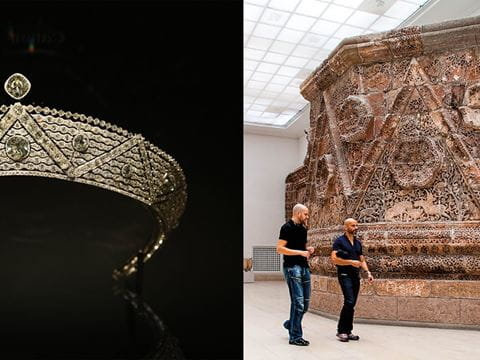
The Sweetness of My Middle Eastern Vegan Kitchen
From hummus to harira to olive oil, ever since the dawn of agriculture, the Middle East has offered delicious, healthy, environmentally low-impact foodways that honor tradition while embracing innovation.
The dish is famous in kitchens across the Middle East. My mother taught it to me, and tonight I am preparing it for my family. Taze Fasulye—fresh bean casserole—has proven to be a rich, nourishing comfort food amid duress over the past year. But in my kitchen, the butter and lamb my mother used have been replaced by my olive oil and chickpeas.
I am far from the only cook in the Middle East choosing to replace dairy, meat and other animal products with plant-based ingredients. The headlines and news features tell me it’s a growing trend across this part of the world, too. What once had a reputation for bland flavors and strict rules has become abundant, delicious and popular, especially among the younger generations.
Last year the California-based trade group Plant-Based Foods Association released data showing that plant-based food sales in the United States increased 90 percent over the previous year and were outpacing conventional retail food sales by 35 percent. Across the Middle East and Africa, according to a 2019 report by UK-based Triton Market Research, the meat substitutes market is expected to grow annually over the next six years at a fraction under 10 percent. The same report details the rise in vegan cafes and restaurants in the region that parallels growing consumer access to plant-based food products. This year, Veganity, which claims to be the world’s largest vegan restaurant, opened in Dubai with a menu of more than 200 choices.
This trend is especially significant because Middle Eastern and Mediterranean food, the cuisine I grew up on, so often features meat and fish. However, a number of the region’s most famous foods have always been plant-based: hummus, the chickpea-based dish that is popularly consumed as a spread, dip or a base for sandwiches; falafel, a classic street food that usually comes as a deep-fried, spiced ball of either ground chickpeas or fava beans; kushari, the Egyptian comfort bowl of lentils, rice, chickpeas and tomato sauce topped with crispy onions; baba ghannouj, grilled eggplant mixed with tahini, olive oil and seasoning topped with pomegranate seeds; and tabbouleh, a salad made of finely chopped tomatoes, mint, onions, burghul and parsley.

As I have attempted over the past year to reimagine my mother’s home cooking (and add inventions of my own), I have found it relatively easy to make adaptations. I’ve also found it’s healthy. And perhaps most of all, it’s changed the way I experience food: It tastes better than ever.
“Processed foods are engineered to hit a ‘bliss point’” of salt, sugar and fat “that dig into our evolutionary survival drives,” says Dr. Michael Greger, a Maryland-based author and physician specializing in clinical nutrition. He’s also a member of the Council of Directors for True Health Initiative comprised of 350 academics, surgeon generals, athletes, doctors and environmentalists in 35 countries who support plant-based eating.
I have found it relatively easy to make adaptations—and food tastes better than ever.

What many people find most surprising about plant-based eating, he says, is that after only a few days, taste buds start to readjust, and the combinations of vegetables and legumes take on an unexpected depth of flavor—even before the spices that Middle East foods are particularly famous for get taken into account.
“Vegan diets can be followed quite easily in the region,” says Hanan Sayed Worrel, a longtime resident of the United Arab Emirates and author of Table Tales: The Global Nomad Cuisine of Abu Dhabi. Worrel has been a constant guide in my meatless culinary adventures, and her expertise in the traditions of Middle Eastern cooking include the powerful role plants have played in Arab cuisine for thousands of years.
“Our dishes in the Levant have a nonmeat and nondairy option,” she says. “All the stuffed dishes like grape leaves and courgettes can be made without meat.”

So much of Arab cooking with meat is, like many other world cuisines, bound up in cultures of hospitality and holidays. For example, a guest at an Arab dinner table must by custom be offered the largest, most tender portion of meat. Eid al-Adha, the Islamic Feast of the Sacrifice, traditionally features lamb, sheep or goat for the dinner. This day is also the year’s leading occasion for zakat, or charity, one of the five pillars of Islam, which is performed by the giving and receiving of meat, from those with the means to buy it to those without.
But among the rising generation, Earth- and health-conscience choices are often top of mind, and new alternatives may emerge. A 2016 University of Oxford study published in the UK-based Proceedings of National Academy of Sciences journal found that by 2050, “food-related greenhouse gas emissions could account for half of the emissions the world” and “adopting global dietary guidelines would cut food-related emissions by 29 percent, vegetarian diets by 63 percent, and vegan diets, 70 percent.”
Worrel’s vegan adaptations of classic Middle Eastern recipes include dishes such as a simple and bright fennel and beetroot salad with tahini and dill, usually served with yogurt. She also loves cooking falafel and hummus dishes, runner beans with tomato sauce, and harira soup with mushrooms.
“My most-recent favorite is a fresh coconut drink with cashews,” Worrel says.
Reflecting on why veganism is on the rise in the region, Worrel also notes millennials’ exposure to special dietary preferences and acceptance of accommodating food restrictions.
“Now when I have dinner parties, I need to remember to ask my guests whether they have dietary restrictions. Five years ago, I didn’t have to do that,” she says.
She also notes how younger generations are growing up with a more open ethical question regarding the human relationship to other animals. For older generations, she says, meat represents culture, nourishment and stability, but younger people often see over-processed foods, health hazards and a globally shared sense of responsibility for sustainable lifestyles.
Sukkari Life is the YouTube channel and website of Saudi-based yoga instructor and plant-based diet teacher Raoum AlSuhaibani. She speaks to more than 265,000 followers each week, many in the Arabian Peninsula region, from long-time vegans to those newly curious. She explains that in Arabic, sukkari means “sugary,” and it’s her way of reminding viewers that plant-based eating can make life a little better, a little sweeter. It also has a personal connection: “I named it after my favorite types of dates, the Sukkari dates that are grown in my hometown al-Qassim, Saudi Arabia.” Her favorite ingredients, she says, “are simple and local. I love to add dates to my recipes and legumes, such as fava, garbanzo and lentils.”
But more broadly, she says, plant-based diets and veganism resonates with her sense of how the world could be. And though she approached the recipes as a challenge, she has favored the simple kinds of dishes most of us can make with limited time and resources. She encourages experimenting with tastes and textures, for example sometimes adding edible flowers to style her dishes.
“I have noticed the rise of veganism in the region, firstly among Millennials and then more broadly. Now when I have dinner parties, I need to remember to ask my guests if they have dietary restrictions. Five years ago I didn’t have to do that.”
—Hanan Sayed Worrel

She’s also no absolutist. She feels that claims of all-or-nothing lifestyles can be off-putting to newcomers. This is where “flexitarian,” or part-time plant-based eating, is important. “Personally, I find it easy to eat plant-based,” she says, “but it gets tricky sometimes when it comes to other aspects of life.”
Does her success surprise her? “Sometimes,” she says. “Especially when I meet people in person and they tell me how much my channel has affected their lives.”
The food culture is changing in the Middle East, she says. “When I was a vegetarian, a lot of people commented, teased and showed signs of concern. Now, even though I’m vegan, people are usually asking questions out of curiosity, as they want to try to live this way.”
As I pull my taze fasulye from the oven, its aromas fill the kitchen, and my cats Mimi and Koko weave around my feet. They are as much a part of my family as anyone, and my affection for them carries me over to other non-human animals—pets, wild and on farms. Such thoughts make me feel good about the plant-based eating journey I set out on. It makes the taze fasulye as delicious and as filling as ever it was when I was a child—and even a little sweeter.
About the Author

Beliz Tecirli
Beliz Tecirli, Ph.D., advises on sustainability and environment, social, governance (ESG) performance for businesses and she also specializes in sustainable urban cultural development. She writes about art, culture, lifestyle and environmental impact in the Arabian Peninsula and beyond.
Matthew Bromley
Artist, illustrator and publication designer Matthew Bromley runs Graphic Engine Design in Austin, Texas, and he is the graphic designer of AramcoWorld. Contact him at mbromley@graphicengine.net, @robot.matthew.bromley on Instagram.
You may also be interested in...

Recipe: How a Spanish Tortilla Got Me Over My Distaste for Eggs
Food
A lifelong egg aversion softens through a recipe by Jeff Koehler for a simple Spanish tortilla and the quiet resourcefulness it shares with Pakistani kitchens.
Handmade, Ever Relevant: Ithra Show Honors Timeless Craftsmanship
Arts
“In Praise of the Artisan,” an exhibition at Ithra in Dhahran, Saudi Arabia, aims to showcase Islamic arts-and-crafts heritage and inspire the next generation to keep traditions alive.
Cartier and Islamic Design’s Enduring Influence
Arts
For generations Cartier looked to the patterns, colors and shapes of the Islamic world to create striking jewelry.


